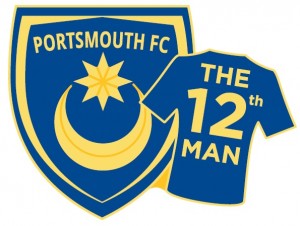FC Portsmouth 2
Fratton Park in the 1920′s and 1930′s
Apart from the Chimes, very little is known about the singing during the early days at Fratton Park. Elderly fans whose memories go back to the 1920′s and 1930′s say how different Fratton Park was in those days, with no segregation of fans and no hooliganism. A couple of fans, worse for drink, might come to blows, but there was little in the way of group aggression; everything was casual and easy-going. The sailors in the crowd used to cheer for the opposition team “as a matter of principle”, and young lads were allowed to sit on the grass just inside the touchline. What idyllic days they were, to be sure!
Spontaneous singing was very sparse apart from the Chimes which was sung at most matches. Certainly, there was nothing of the continuous singing and chanting that so typifies the contemporary game. However, some fans have vivid memories of singing “To be a farmer’s boy” for Pompey’s popular centre forward, Billy Haines, as he came out onto the field in the 1920′s. The song referred to Billy’s farming background in Somerset.
Billy Haines was certainly a great character and was well-liked by Pompey fans; rather like Alan Biley in the early 1980s. Billy had an unusual method of penalty taking; he never ran up to kick the ball, but he used to put it on the spot and then bend down as though to study it, before banging it into the net without moving. He deceived many a goalkeeper with that trick. Billy was the club’s leading goalscorer from 1923 to 1928 when he moved up the road to Southampton. During that time he scored 128 goals in 180 league and cup games.
Supporters’ Club Songs of the 1950′s
The Portsmouth London Supporters’ Club (still going strong today) was an important source of songs in the 1950′s, which were sung mainly on coach trips to away grounds. Their ‘official’ song went as follows:
“We’re all right, merry and bright,
We’ve all had a jolly good time.
With a heave-ho and a wakey-wakey,
Whether you’re a tar or a dockyard matey,
Don’t be downhearted, cheer them on their way,
With a 1-2-3-4, Pompey! Hip hip hooray!”
In the late 1950′s and early 1960′s, Barry Harris, who was then the sailor-suited Pompey mascot and who later became the “over-age” ball-boy at Fratton Park, was mainly responsible for leading the singing of the Pompey fans at away matches. Barry had several favourite songs for the long coach trips, mostly unconnected with football, many mildly obscene, but all very humorous. Here are a couple from his repertoire:
“Virgin sturgeon needs no urgin’,
Virgin sturgeon’s a very fine fish;
Virgin sturgeon needs no urgin’,
That’s why cavair is my dish.
I gave caviar to my cockerel,
And my cockerel nearly died;
I gave caviar to my cockerel,
Now my hens are satisfied!
Be I ‘ampshire, be I buggery,
I comes up from Fareham.
My old girl’s got fifteen kids,
And she knows how to bear ‘em.”
During this era another song with local flavour was sung by lads from the housing estate of Paulsgrove, which went something like this:
“We are the Paulsgrove boys
Respected wherever we go.
We spends our tanners,
We minds our manners.
Put that fucking Woodbine out!”
The following two chants were popular with the fans in the late 1950′s and early 1960′s and tended to be sung together:
“1-2-3-4,
Who d’ya think we’re shouting for?
P-O-M-P-E-Y.
Pompey!”
“2-4-6-8,
Who do we appreciate?
P-O-M-P-E-Y.
Pompey!”
Several football songs and chants were included by Iona and Peter Opie in their book ‘The Lore and Language of Schoolchildren’ (Ref 7), including the “Two, four, six, eight” chant, which was popular in many sports and regions in the 1950′s. Although the chant is no longer part of the modern football repertoire, there is a variation in which the name of the club is spelled out letter by letter by a leader with the main chorus replying.
During this period some fans recall standing behind the goal at Fratton Park and throwing sweets to goalkeeper, Norman Upritchard, and moving up the other end at half time. Unfortunately, it is no longer possible to move so freely around the ground due to the many barriers and police restrictions on the movement of fans. Also, it is likely that these fans would now be arrested for throwing missiles onto the field!

